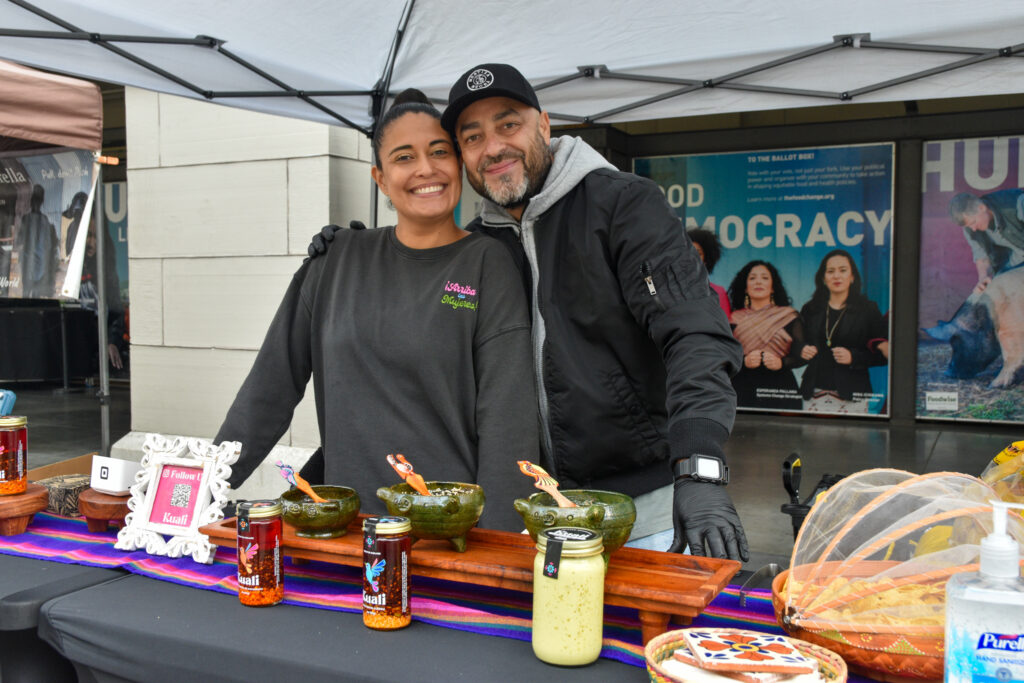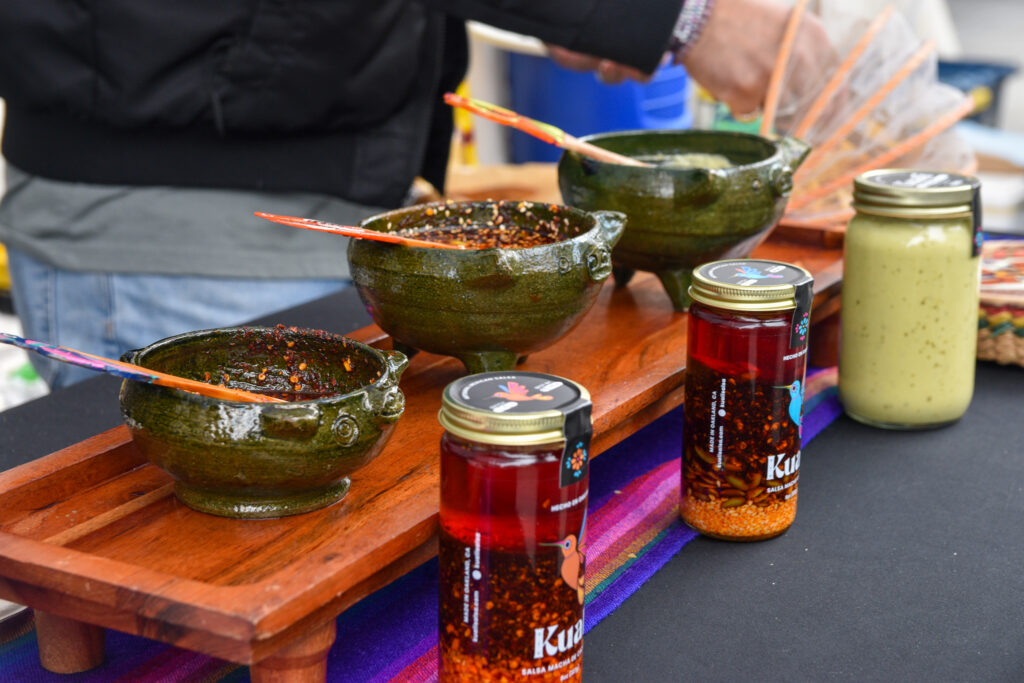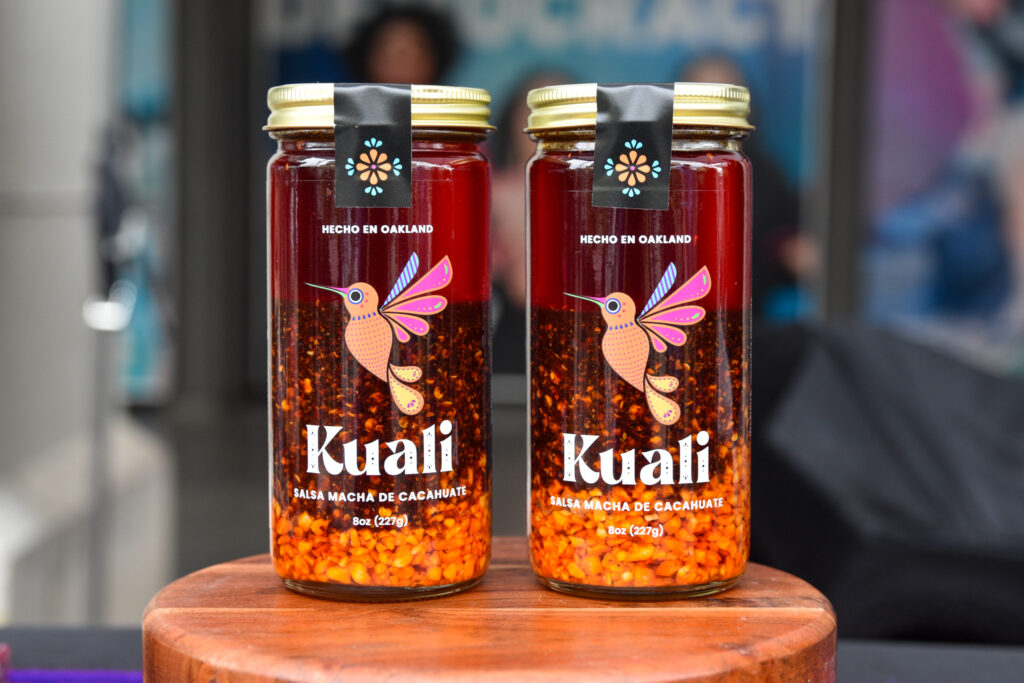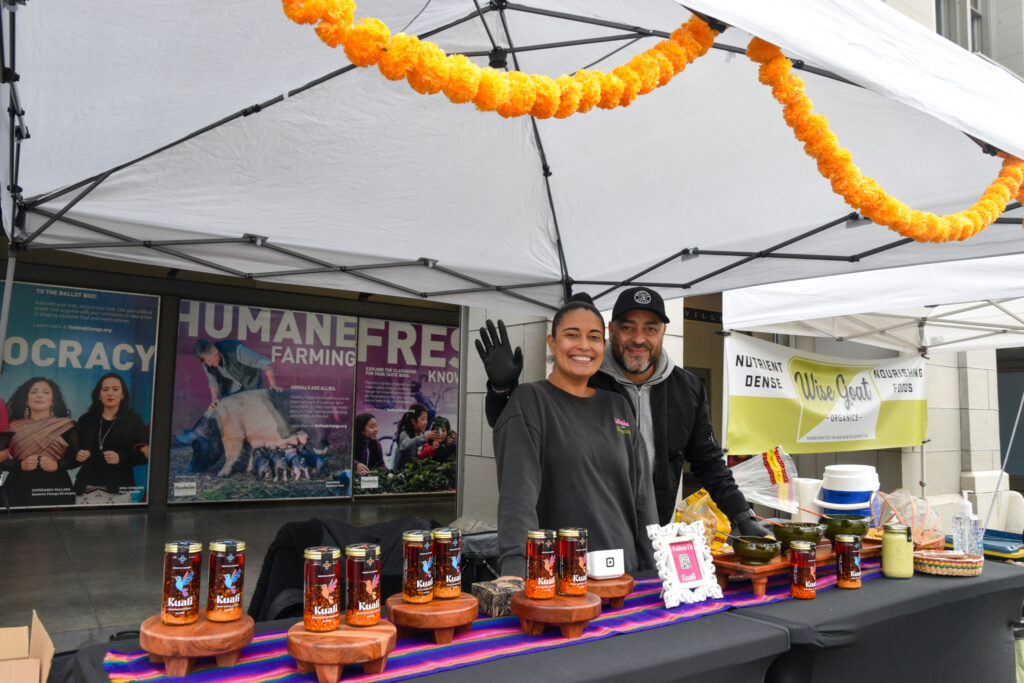Kuali’s Salsa Macha Brings Deep Roots and a Fiery Kick to the Modern Salsa Scene
Selina Knowles, Communications Coordinator
November 10, 2023

Rodrigo Cruz used to always find himself bringing his own salsas to restaurants. “The salsas at any of the restaurants in the Bay area, honestly, they were always mild for my palette.”
Rodrigo’s wife, Janeen Cruz, agrees that the options were completely lacking. She says, “I would never buy anything right now that’s at the store. I just don’t think that it caters to our community. It’s always mild. It’s never spicy, it’s never bold.”
Taking matters into their own hands, the Cruzes started Kuali, an artisanal salsa business, in 2020, and they recently joined the Ferry Plaza Farmers Market on Saturdays. Kuali uses family recipes, in a style of salsa making traceable to Indigenous Mexican cultures, to create an alternative to the blandness of America’s mainstream salsa scene.

The Disappointing Taste of Colonization
Salsa is an extremely important aspect of Mexican cuisine, and there are many different varieties. “Our culture is very heat forward,” says Janeen, who is the daughter of Mexican immigrants from El Ejido Hermosillo, Baja California, Mexico. “We eat salsa three times a day. That’s breakfast, lunch, and dinner.”
Since immigrating from México City, Mexico over 20 years ago, Rodrigo has been continuously disappointed by the salsa options in the United States. While salsa dethroned ketchup as the most popular condiment in the US in the early nineties, mainstream varieties tend to cater to a historically spice-averse European descendant palate.
While most cuisines around the world feature a layering of spices to build flavor within a dish, Western European cuisines have traditionally been lighter on the spices since colonization led to their widespread accessibility. Into the Middle Ages, spices were an exclusive commodity, only available to the upper class. When Europe started colonizing parts of India and the Americas, spices became more and more commonplace and thus cheaper.
Wealthier tastemakers stopped using spices around the 1600s to distance themselves from the lower class, and they started relying more on compatible flavors (like potatoes and leeks). Since the European palate adapted to blander flavors, the food available in America leaves something to be desired for heat-lovers.

Preserving Heat and Tradition Across Generations
To the rescue, Rodrigo and Janeen pull from traditions native to the Americas. At the farmers market, Kuali offers spicy, crunchy Salsa Macha, which originated in Veracruz, Mexico. The indigenous Totonac people ground dried chiles, sesame seeds, and salt, for a deeply flavorful paste.
In modern times and across the diaspora, there are many variations of salsa macha, including Kuali’s oil-based recipe that was passed down to Rodrigo from his mother, Mely. While Janeen and Rodrigo are understandably protective of the secrets of their family recipe, they are eager to share a taste of why they love it so much.
Mid-pandemic in 2020, Janeen was looking for a new career opportunity, and she and Rodrigo experimented with sharing their salsa stories on social media. After spiking in popularity during people’s pandemic culinary explorations, spicy, bold flavored condiments are still on the upward trend. They started getting a few orders each week, and the demand has only continued to grow.
From the precise blend of peppers to the name and design on the bottles, every aspect of Kuali carries a story of family and tradition. The name Kuali is derived from Nahuatl, in the family of Indigenous languages of the Americas known as Uto-Aztecan. When naming the business, Rodrigo and Janeen consulted Rodrigo’s father, who speaks some Nahuatl. He suggested the name Kuali, which means “good.”
As for the iconic, vibrant hummingbird seen on Kuali’s jars, Rodrigo says that it represents his mother, who passed away seven years ago. “When I was a kid, when she was cooking at the house, the kitchen was facing the garden. A lot of hummingbirds came to the window and she always said, ‘Look, look, your grandma’s here. Every time you see a hummingbird, it’s because someone from the other side is bringing you love and thinking about you.’”
Even though she didn’t know about this business that Rodrigo and Janeen would start, Rodrigo wants to honor the influence she’s had. “She’s the one who gave me all this love for salsas and created her recipes. She’s the reason for all this,” he says.

Meeting Salsa Lovers from Near and Far at the Farmers Market
Before they joined the Ferry Plaza Farmers Market in October 2023, Rodrigo and Janeen had popped up at over 300 events, and they were ready to find a consistent base where customers could discover them and know where to visit them again. Janeen says, “It’s been very life changing to have this opportunity.”
When you visit their stand on Saturdays, the Cruzes invite you to sample each of their offerings: Salsa Macha Clásica with roasted pumpkin seeds, Salsa Macha de Cacahuate (crushed peanuts), and their creamy salsa verde.
“What we’ve been so taken aback by is the response of the international community who’ve come by our booth,” says Janeen, referring to visitors from all over the world, including Denmark, Germany, Australia, and India. “[They] have fallen in love with our salsa and have pushed us to think about our business outside of the US and what’s possible.”
Local and international eaters alike are often trying salsa macha for the first time at the Ferry Plaza Farmers Market, where Kuali welcomes both adventurous eaters looking to expand their tastes as well as confident spice lovers who might be caught bringing their own salsa to the restaurant.
And in that spirit of exploration, Janeen encourages people to not feel limited to just tacos and chips when enjoying salsa. “There’s no rules with salsa, however you want to eat it, whatever food you want to put it on, that’s okay.”
Find Kuali at the Ferry Plaza Farmers Market on Saturdays.
Topics: Culinary, Farmers market, Food makers, Small business
